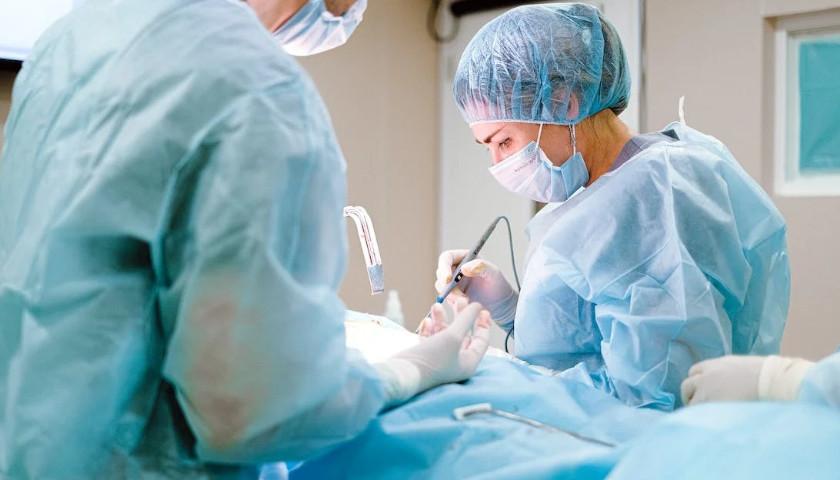by Laurel Duggan
Surgeons at Oregon Health and Science University (OHSU) are using a medical robot to assist with vaginoplasties, or the surgical construction of a vulva and vagina, according to various posts on the organization’s website.
OHSU’s gender program, urological program and reconstructive urology referral center all boast of a high volume of clients on their respective web pages, and Dr. Blair Peters, a surgeon leading the gender program, boasted that the gender surgery clinic had “the highest volume on the West Coast” and could operate two robot-assisted vaginoplasties daily, according to a recent report from the Manhattan Institute’s City Journal. In addition to vaginoplasty, OHSU offers phalloplasty (the surgical construction of a penis), non-binary genital “nullification” surgeries and mastectomies.
The vaginoplasty robot, which City Journal called a “castration machine,” allows surgeons to use internal tissue to construct a vagina, replacing or supplementing the more common technique of using existing male genital tissue.
 “Robotic surgery is a sophisticated way of doing surgery on the inside of the belly cavity without making a big incision. And that approach allows you to use tissue from the inside of the belly cavity to be part of the vagina,” an OHSU employee explained in a 2021 video on OHSU’s YouTube channel.
“Robotic surgery is a sophisticated way of doing surgery on the inside of the belly cavity without making a big incision. And that approach allows you to use tissue from the inside of the belly cavity to be part of the vagina,” an OHSU employee explained in a 2021 video on OHSU’s YouTube channel.
“In addition to the traditional penile inversion vaginoplasty, we also offer a robotic approach. In the robotic approach, we create your external genitals in the same way, but I also make an incision above your belly button and one on your hip,” OHSU surgeon Dr. Geolani Dy said in the same video. “And through these incisions, I am able to bring in the robotic instruments. Using the robotic instruments, I dissect a space between your bladder and your rectum for your vagina. The robotic approach also allows me to take tissue from the inner lining of your belly called peritoneum. Using the peritoneum, I make the deepest portion of your vagina. The robotic approach may be especially useful for people with limited genital skin.”
OHSU surgeon Dr. Blair Peters has discussed vaginoplasties and the use of the surgical robot, including on young patients, in several public interviews. Peters admitted that genital surgeries are performed on adolescents and suggested that medical professionals are still figuring out “what works” in a video published by Manhattan Institute senior fellow Christopher Rufo.
“As a specialty, those of us that do a pretty high volume of genital gender confirming surgery, we’ve maybe done a couple, a handful of pubertally suppressed adolescents as a field, and nobody’s published on it yet,” he said. “OHSU is just putting our first series together as we’re sort of learning and figuring out what works. But it’s really changing things because you don’t have enough tissue to line the vaginal canal … the way that we’re dealing with it is by using a robot.”
Peters discussed his concerns about the ethics of puberty blockers and genital surgeries for adolescents in another clip that appears to have been pulled from the same interview. Youth who have their puberty medically suppressed may not have enough genital tissue to create a vagina if they pursue vaginoplasty in their late teens, and their usual lack of sexual experience makes it difficult for them to adjust to the daily vaginal dilation that’s required as long-term post-operative care.
“Some of the early challenges are getting someone to successfully dilate that’s never had to engage with their pelvic floor musculature and is maybe 17, 18 years old. It’s hard,” he said.
These young patients’ lack of sexual experience also makes it difficult to assess the impact of the surgery on their sexual health, according to Peters.
“More often than not there’s been almost no genital engagement in terms of self-stimulation or masturbation so then trying to assess things like erogenous outcomes after a surgery when someone’s never had an erogenous experience in her life is incredibly difficult, because they don’t really have a baseline to compare it to,” he said.
A group of nine patients published a letter in 2018 complaining that they experience physical injuries and sexual dysfunction after undergoing genital surgeries at OHSU.
– – –
Laurel Duggan is a reporter at Daily Caller News Foundation.






I’d be a lot more appalled by this if it wasn’t happening in Oregon. Hopefully none of these sex changes will result in much, if any, procreation, so the whole state will eventually simply be depopulated and we can go back to granting homesteads to people who can resettle it, essentially going back to the factory settings by pulling the plug and plugging it back in again.